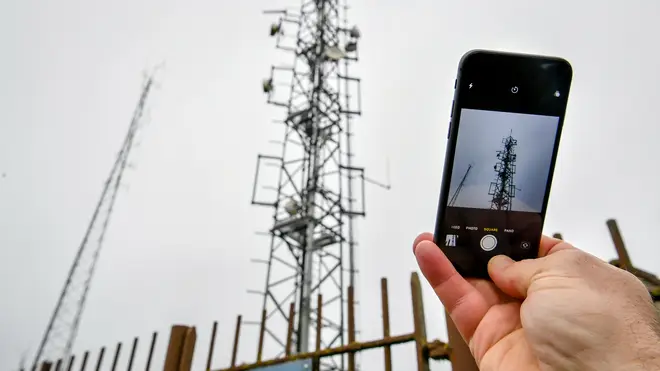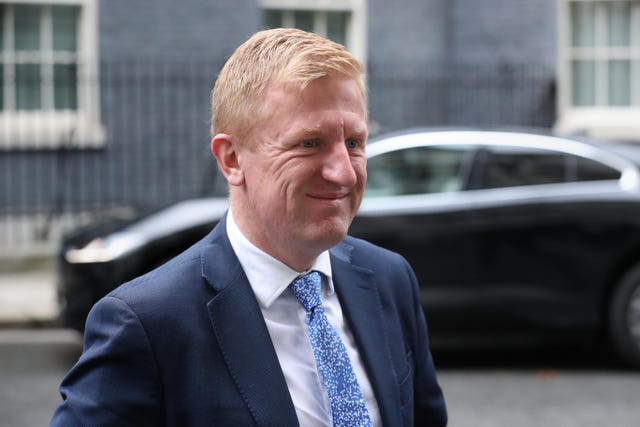
Ian Payne 4am - 7am
30 November 2020, 22:34

Culture Secretary Oliver Dowden said the Bill is designed to tackle ‘not only the Huaweis of today but the Huaweis of tomorrow’.
A bid to block the installation of new Huawei technology in the UK’s 5G network has passed its first Commons hurdle.
The Telecommunications (Security) Bill passed its second reading without a division and will now progress for further scrutiny.
Culture Secretary Oliver Dowden told the Commons the Bill is designed to tackle “not only the Huaweis of today but the Huaweis of tomorrow wherever they come from”.
He added: “It does need to be flexible enough to cover future threats and not tie our hands by limiting our response to one company and one company alone.”
The Bill would force providers to stop installing Huawei equipment in the UK’s 5G networks from next September and it also sets out a roadmap to remove high-risk vendors altogether.
Conservative former leader Sir Iain Duncan Smith said the September 2021 date was “better than I would have expected”, before raising concerns about the UK’s Government past approach to China and suggesting a more formal structure to advise the Secretary of State on future decisions is required.
He added: “Otherwise it’ll be too easy for a Secretary of State under pressure from the Business Secretary, under pressure from a Chancellor – such as one which we once had (George Osborne) who was very keen on a golden era – leaning and saying ‘do you know what, do you really need to go down this road?’, that will happen.
“I sat as a Secretary of State, I can tell you now all that stuff happens and anybody else will tell you too.
“So, I think a more structured approach does not allow the Secretary of State to miss the right people on advice.”

In the summer, the Government announced that the Chinese firm was to be banned from the most sensitive core parts of UK networks.
It followed a growing backlash from Conservative backbenchers over a decision in January to allow Huawei technology in the UK’s 5G network, albeit with restrictions.
Tom Tugendhat, Conservative chairman of the Commons Foreign Affairs Select Committee, said the Government has listened to its backbenchers’ concerns.
He added: “The minister has done a very good job in listening. There was a time earlier this year when many of us thought this could become a very difficult issue for the Government.
“I have to say the minister and his entire department have done a fantastic job in listening, not just to this side of the House but the other and making sure that the points that we raised have been addressed.”
Labour’s shadow culture secretary Jo Stevens said action to remove high-risk vendors from the UK’s telecoms networks must go hand in hand with measures to diversify the supply chain.
She said: “Let’s be frank, until this year the Government had failed to face reality.
“We will not oppose the second reading of this Bill, but we have many concerns which will need to be considered and addressed at committee stage because the Bill this House eventually passes must take steps to ensure that our telecoms supply chain is resilient in the future or we’ll be forced to return here again in a short time to deal with the next Huawei.
“We must be mindful as with all legislation that we seek to anticipate the problems of the future rather than just deal with the issue we face today. We, of course, fully support steps to remove high-risk vendors from the network, but they absolutely must go hand in hand with credible measures to diversify the supply chain.”
The Bill will force the removal of all Huawei equipment from 5G networks by 2027 and create national security powers capable of imposing controls on when – if at all – a telecoms firm could use material supplied by companies such as Huawei.
The Government has published a 5G Supply Chain Diversification Strategy to ensure the UK is “never again dependent on a handful of telecoms vendors”.
Under the legislation, security protocols around UK networks will also be strengthened with fines – of 10% of turnover or £100,000 a day – for those who do not meet the new standards.
Communications regulator Ofcom is to be tasked with the monitoring and assessing of security protocols among telecoms providers.